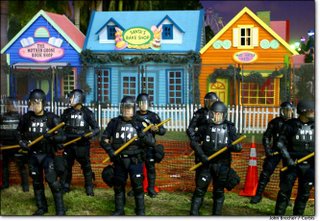Reading large amounts of government statements and economic analysis is not as much fun as you might think. Currently my brains feel like they are dripping slowly out of my ears. Or perhaps that's the wine.
The rough response to the protesters outside the G8 conference was of course a very bad thing - but not half as bad as what was occurring inside. Every year these eight businessmen get together to decide the future of Earth Inc. (although it must be said they are not all men, Angela Merkle is a cyborg) and that future is not smile shaped.
Every year these eight businessmen get together to decide the future of Earth Inc. (although it must be said they are not all men, Angela Merkle is a cyborg) and that future is not smile shaped.
There was lots of hype last year on Africa but it turns out that in fact that this was a load of, well, hype.
Last year the G8 made a commitment that poor countries would be able to "determine their own economic policies" - but that was out the window before you could say 'neoliberalism'. Bush didn't even wait for the conference to be over before stating "We're really not interested in supporting a government that doesn't have open economies and open markets. We expect there to be, you know, reciprocation." You can have your own economic policies, and we'll let you know what they are.
This year the G8 stated that "we reiterate our commitment... to remove distortions to the global adjustment process, promote liberalisation of trade and investment, and modernise the international financial institutions." Economic autonomy is anathema - everything must be up for sale.
Despite the rhetoric on debt cancellation the true picture is pretty shocking. It simply has not happened. Of the potential future cancellations only 18 countries may qualify and that debt repayment will come out of their aid budget - which means that the money goes to the West. Hurrah for Hillary Benn shout the bankers?
Another 22 countries may qualify for the scheme but it's not likely to happen for some time because the IMF and WTO are not happy that these countries have complied with their instructions. The master has spoken, obey or feel the crack of his whip.
Israel caused great friction on the Monday where world leaders had a very different way of looking at the crisis -even after they'd signed an agreement. Chirac said "It is clear that the G8 is calling for a ceasefire. I can tell you that the whole of the G8 has called for a ceasefire in Gaza and Lebanon." Perhaps it wasn't quite as clear as he thought as the US announced that "there was no push for a ceasefire this weekend" and Putin called for a "balanced use of force" - what does that even mean?
Russia was keen for energy to be high on the agenda. The biggest shift seems to have been that Russia has "pledged" to open its energy sector to foreign investment and the world leaders agreed that nuclear power was great. There is a statement on climate change but its so laden with caveats and opt outs as to make it meaningless, as you might expect when the US has to agree the wording.
The G8 neatly summed up its philosophy when it said that "free, competitive and open markets are essential to the efficient functioning of the global energy system." Are you detecting a theme here? In fact when it comes to education, renewables or any other substantial statement the running thread is that the private sector will provide.
When it came to trade and the third world there were blockages even getting to discuss the issues because Russia has been denied entry to the WTO and so it was keen on using summit time to press this issue. The US still refused to allow their entry though due to their, bizarrely peripheral but predictable, insistence that Russia lower health standard on its imports of US beef and pork. There was much focus on the Doha Development Agenda, a set of talks that has been lumbering on for five years, and had been promoted as progress for poorer countries. WDM wanted Doha to "ensure developing countries could use import tariffs to protect food security, livelihoods or fledgling industries" but the reality is set to be far more bad than good.
There was much focus on the Doha Development Agenda, a set of talks that has been lumbering on for five years, and had been promoted as progress for poorer countries. WDM wanted Doha to "ensure developing countries could use import tariffs to protect food security, livelihoods or fledgling industries" but the reality is set to be far more bad than good.
The US criticised developing nations like Brazil for not being ready to open their markets to imports whilst the US gives heavy subsidies to its own producers - this is less free market policy and more economic imperialism. The G8 agreed that Doha now has a one month deadline to finalise the talks and under pressure the governments of China, Brazil, Mexico, India and South Africa have begun to buckle.
The US smuggly stated that "there were encouraging signs of flexibility from leaders of key developing countries" and that the "aim of facilitating agreement on negotiating modalities on agriculture and industrial tariffs" was within sight. Just to spell out what that means in English Doha "should deliver real cuts in tariffs, effective cuts in subsidies and real new trade flows."
"We commit ourselves to substantial improvement in market access for trade in both agricultural and industrial products and to expanding opportunities for trade in services."
Reading the documents and press statements it becomes clearer and clearer that the G8 is a club for the rich to work out how they can screw the poor - and they aren't ashamed of it. Whilst they issue statements like "trade and market opening can be a vital engine for development" the truth is that these representatives of capital impoverish the world in pursuit of maximising the profits of their multinationals and that the dominant economic trend today is privatisation, breaking down trade barriers in the poorest countries whilst maintaining vast subsidies for the rich.
Saturday, July 22, 2006
How free is the market?
Labels: Alternatives, Democracy, Thinking aloud
Subscribe to:
Post Comments (Atom)

2 comments:
I love your website. It has a lot of great pictures and is very informative.
»
I'm impressed with your site, very nice graphics!
»
Post a Comment